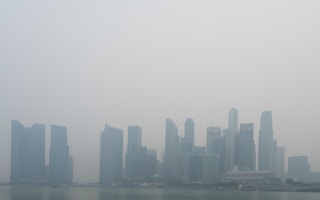An international coalition of non-government organisations (NGOs) is rallying financial regulators to introduce sanctions to stop banks from funding companies that are responsible for the haze, even as new fires in Indonesia and Malaysia threaten the start of another haze season.
To continue reading, subscribe to Eco‑Business.
There's something for everyone. We offer a range of subscription plans.
- Access our stories and receive our Insights Weekly newsletter with the free EB Member plan.
- Unlock unlimited access to our content and archive with EB Circle.
- Publish your content with EB Premium.
In an open letter sent to over 50 international organisations, banks, and financial regulators in Indonesia, Malaysia, Singapore, Japan, China, Europe, and the United States on Wednesday, the coalition said that banks which finance companies linked to the fires “share responsibility for the harmful and illegal impacts of their clients”.
It is illegal for commercial plantation companies to clear land through slash-and-burn practices but this method persists because it is much cheaper than using proper logging techniques. Poor – and sometimes corrupt – law enforcement also allows the burning to continue.
If banks won’t impose the necessary checks and safeguards to stop financing the haze, regulatory authorities should step in and force them to do so, said the coalition. Its members included Transformasi untuk Keadilan Indonesia (TuK INDONESIA), Friends of the Earth Indonesia (Walhi), US-based Rainforest Action Network (RAN) and Sierra Club, and Singapore initiative People’s Movement to Stop Haze (PM Haze).
There were 413 agribusiness companies linked to last year’s record-breaking haze season, and these firms received more than US$17 billion in financial services and investment from over 20 banks since 2009, according to the letter.
RAN spokesperson Tom Picken said in a statement that “banks should not be supporting companies that violate anti-fire laws, but they do.”
They are providing much of the capital to fuel the industrial expansion causing these preventable fires, and “regulators must step in and enforce adequate controls and safeguards on these institutions”, added Picken.
“
Banks should not be supporting companies that violate anti-fire laws, but they do. Regulators must step in and enforce adequate controls and safeguards on these institutions.
Tom Picken, spokesperson, Rainforest Action Network
First, the letter called on financial authorities, especially those in Asia, Europe, and the US to introduce emergency regulations which would allow them to order banks to suspend financial services such as loans, public offerings and investment advisory services to companies found to be causing the haze.
The letter also urged them to mandate stricter due diligence and reporting standards for banks with clients in sectors linked to deforestation and forest fires, and said that stock exchanges should play their part by suspending the listing of companies that fail to conduct responsible business.
Government efforts to strengthen law enforcement and improve fire prevention capacity might be insufficient to prevent a repeat of last year’s haze crisis, said the coalition in its letter, adding that threatening industrial plantation companies with a blow to their topline is a key part of the solution.
Fires in Indonesia last year razed more than 2.6 million hectares of forest. Consequently, the air pollution that had spread across much of Southeast Asia, caused school closures, flight disruptions, and respiratory ailments in Singapore, Malaysia, Thailand, and the Philippines.
In Indonesia, 19 people died from respiratory disease directly linked to the haze, and more than 500,000 people reported similar ailments.
These fires also gave off as much carbon dioxide as the annual emissions of Germany and Japan, and more daily emissions than the entire US economy,
However, Indonesia has taken several steps since then to address the issue, and its officials have said that there is “zero chance” that the crisis will repeat itself this year, and that fires will not reach the same magnitude as 2015’s..
Measures include the establishment of a Peatland Restoration Agency by President Joko Widodo - widely known as Jokowi - in January, targeting to restore about 2 million hectares of peat areas. These carbon-rich swampy soils are highly flammable when dry, and the fires which burn several metres underground are difficult to extinguish.
Earlier this month, Jokowi also announced a moratorium on new permits for oil palm plantations and mining activities, meaning that companies from these sectors would no longer have permission to expand to new areas in Indonesia.
Speaking in Singapore at a conference on sustainable resource use on April 15 Nazir Foead said that even if there are fires this year, they will “dramatically be less”.
“We’re not in a denial stage anymore. We’re in the stage of correcting mistakes of the past,” he added.










